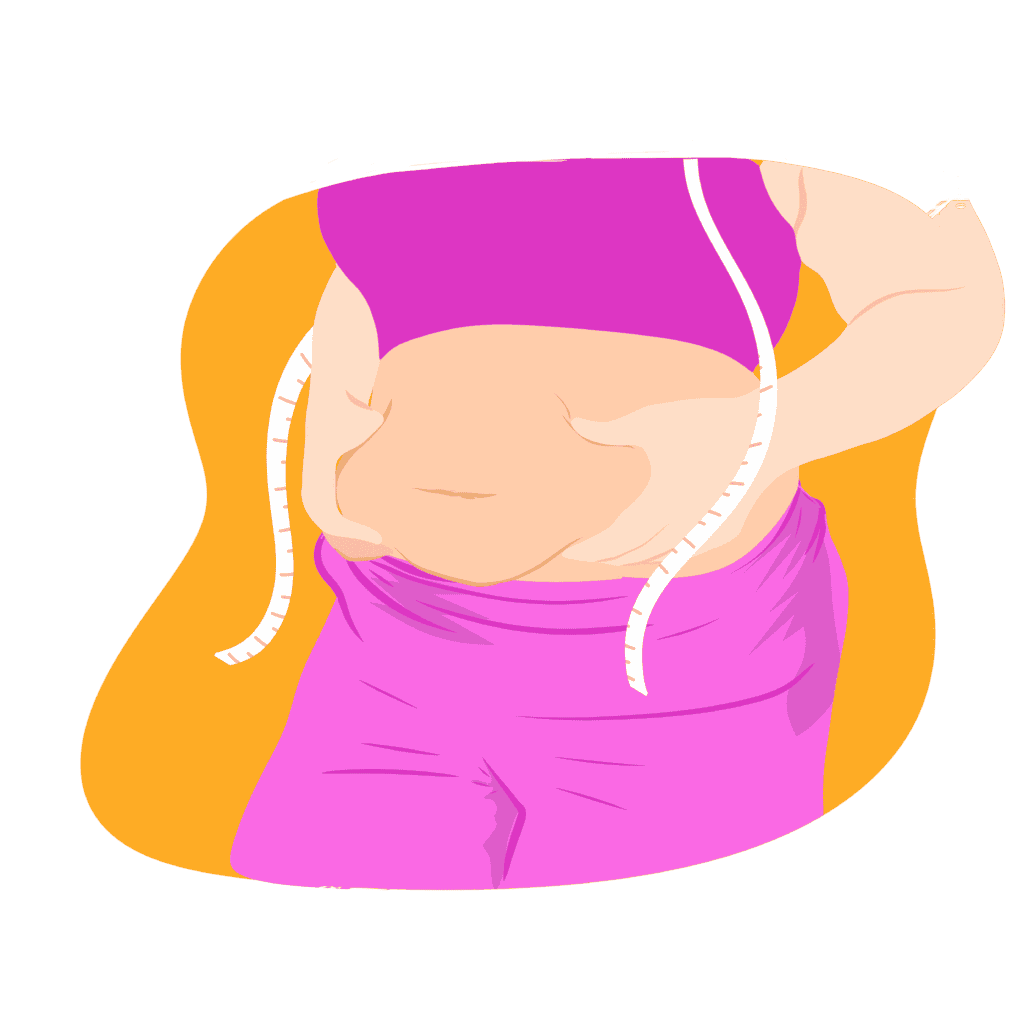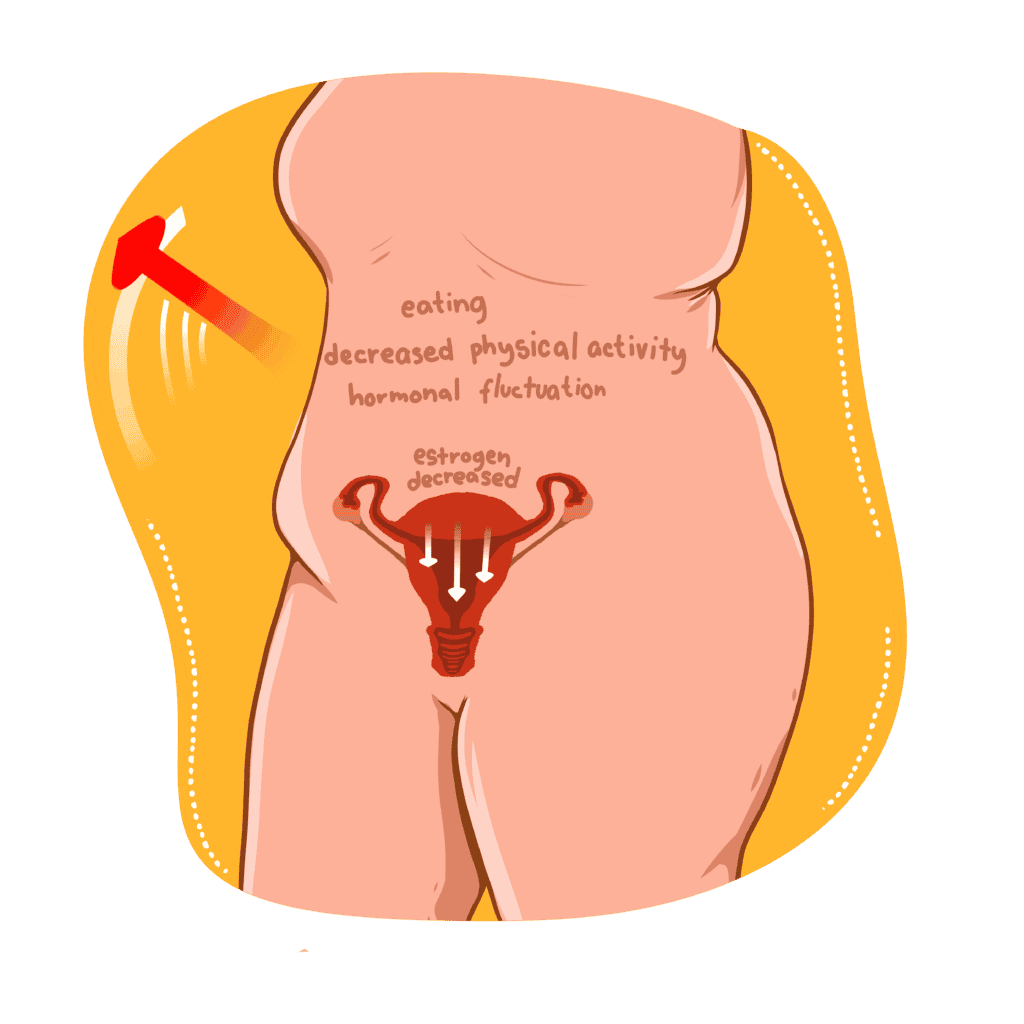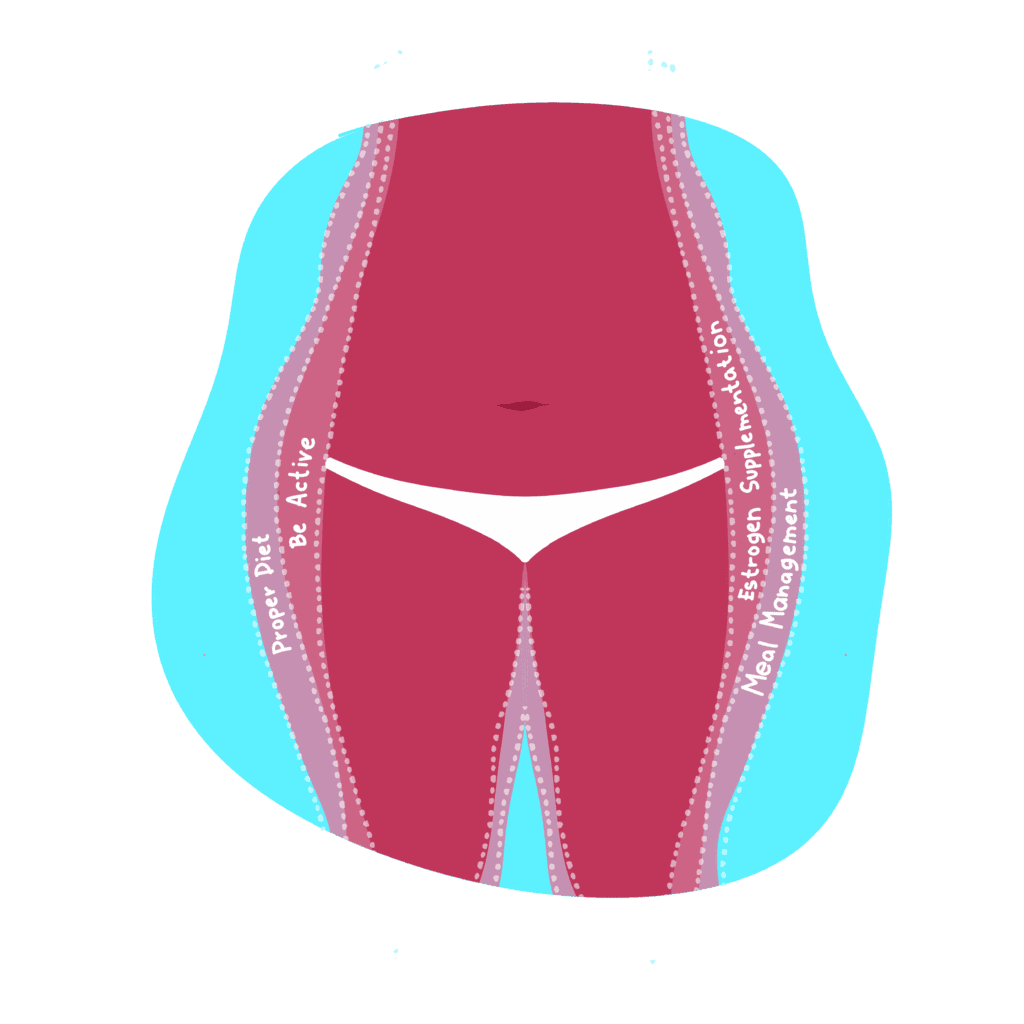Menopausal weight gain, often stored as belly fat in the abdomen due to declining estrogen levels, is a common issue among women during and after menopause. The British Menopause Society reported that around 50% of women experience this with an average gain of 1.5 kg per year during perimenopause. Factors such as hormone fluctuations decreased physical activity, and dietary changes contribute to this weight gain.
Hormone replacement therapy (HRT) may mitigate weight gain by addressing hormonal imbalances, potentially reducing weight gain and abdominal obesity risks. However, consultation with healthcare professionals is advised for personalized management if weight gain is accompanied by concerning symptoms. Read on to learn more about menopause weight gain.
What Is Menopausal Weight Gain?
Menopausal weight gain is defined as the rise in body weight that many women suffer during and after menopause. A significant amount of this weight is stored in the upper body particularly in the abdomen, which causes the menopausal transition to result in an increase in belly fat.
Based on the article published by the British Menopause Society, one of the most common adverse effects of menopause and perimenopause, affecting at least 50% of women, is weight gain. According to their suggestions, women gain around 1.5 kg a year throughout the perimenopause, adding up to an average weight gain of 10 kg by the time they approach menopause. Visceral fat rises from 5–8% of total body weight to 10–15% of total body weight as estrogen levels decline.
Moreover, a variety of factors, including hormone fluctuations, decreased physical activity, changes in dietary preferences, and age-related metabolic shifts, can also be linked to menopausal weight gain. Understanding how these factors interact is essential to developing weight management plans that work during the menopausal transition.

What Causes Weight Gain During Menopause?

Weight gain associated with menopause is a result of decreased circulating estrogen levels caused by ovarian function gradually declining. In addition, the aging process, hormonal fluctuations, decreased physical activity, and recurring emotional eating episodes linked to psychological distress all contribute to the rise in weight gain and total body fat.
To explain the relation between estrogen and menopausal weight gain, according to the study of Pilar Vigil et al. of the Reproductive Health Research Institute, they have found estrogen as the one that handles the healthy distribution and consumption of nutrition by decreasing food intake and boosting energy expenditure. The decline in hormone levels is expected to increase food intake thus contributing to the increase in belly fat.
In the study of Sakshi Chopra et al. from University of Delhi, the concerning rate at which obesity is becoming more and more of an issue is primarily due to variations in women’s age-specific reproductive cycles, which include menopause, lactation, and pregnancy. Approximately 39% of women going through the menopausal transition are either overweight or obese, according to a pooled study of international studies on menopausal obesity.
In addition, changes in lifestyle behaviors such as reduced physical activity and changing food habits, decreasing muscle mass, may occur with aging and can all lead to weight gain during menopause. Putting estrogen supplementation in the spotlight, let’s get into the topic of hormone replacement therapy (HRT) as we proceed and explore how this medication may assist with menopause weight gain.
Can HRT stop Menopausal Weight Gain?
Yes, hormone replacement therapy (HRT) can help mitigate menopausal weight gain. Estrogen supplementation during menopause may help with body weight and composition as several studies have emphasised the effectiveness of HRT in reducing the risk of cardiovascular disease, insulin resistance, and abdominal obesity.
In fact, according to the research conducted by Ineke Van Seumeren of the University Hospital Utrecht from Netherlands, it was concluded that HRT may help reduce the weight gain and redistribution of body fat that happens throughout menopause. This will assist in lowering postmenopausal cardiovascular risk even more. Although HRT may come with some mild side effects and risks, the benefits of hormone therapy can far outweigh its downsides, especially when it comes to conditions like obesity, breast cancer, heart disease, fractures, and strokes.
In addition, it is essential to speak with a healthcare professional in order to customize treatment regimens that meet the unique demands and circumstances of each patient. Let us now shift our focus to discussing menopausal belly fat and reaching weight loss objectives and discuss methods that can help us control weight during menopause.

How Do You Get Rid of Menopause Belly Fat and Lose Weight?

To efficiently eliminate menopausal belly fat and lose weight, a combination of lifestyle adjustments is advised to stop the weight gain. Regular physical activity can help burn calories and enhance metabolic health. Examples of this include swimming, strength training, and brisk walking. Moreover, maintaining a healthy, balanced diet is essential for managing weight during menopause.
Be active
Aerobic exercises and strength training are good options for getting healthy and active during your menopause. Doing exercise would greatly benefit your health but this does not mean that it would make you lose weight right away. Based on the study by Carla Cox, activity that is consistently longer than the basic health requirements (150 minutes per week of moderate-intensity activity) does seem to have a higher potential to support long-term weight loss and maintenance.
Proper Diet and Meal Management
It is evident that dietary restriction is the most significant element of a weight-loss strategy that affects the rate of weight loss during menopause, even though exercise may be the most important component of a regimen for maintaining weight. A daily calorie deficit of roughly 500 kcal or 3,500 kcal per week, along with frequent aerobic and resistance training, is necessary for safe and sustainable weight loss. Making changes to the current eating pattern instead of putting on a one-size-fits-all diet is the most realistic and doable strategy to achieve the necessary calorie deficit.
Estrogen Supplementation
The regulation of body weight is modulated by the reproductive system. Women are known to dramatically reduce their food consumption during the peri-ovulatory period, which is when the menstrual cycle occurs. Consequently, ovulatory disruption such as menopause may theoretically raise the risk of obesity. According to the study of Pilar Vigil et al. from Reproductive Health Research Institute, estrogen decreases hunger and increases feelings of satiety, which controls body weight. As a result, women going through the menopause are more likely to experience metabolic comorbidities like obesity and gaining weight.
As we continue on our path to combat menopausal belly fat and attain our weight loss goals, let us first discuss nutritional changes. Avoiding processed foods and sugar-filled beverages that are high in refined carbohydrates helps us avoid gaining too much weight and improve our ability to lose fat, especially around our midsection. Now, let’s explore the particular foods to stay away from in our effort to say goodbye to abdominal fat that won’t go away throughout menopause.
What Foods to Avoid for Menopause Belly Fat?
In order to effectively manage menopausal belly fat and the unwanted weight gain, it is recommended to steer clear of specific foods that may lead to weight increase and the formation of abdomen fat.
Avoid Too Much Sodium
Gaining weight has been linked to eating excessive amounts of added salt, or sodium. Others have discovered that consuming a lot of salt may raise your risk of weight gain and obesity. It may also cause short-term weight gain owing to fluid retention.
Too Much Sugar in Foods and Beverage
Reducing sugar intake is essential for weight loss since sugar-filled meals and drinks are high in calories but poor in nutrients, causing excessive consumption in calories without satisfying hunger. Additionally, they raise blood sugar levels quickly, which can interfere with hunger signals and result in overeating.
Limit Caffeine Intake
Limiting on caffeine can help with weight loss by lowering cortisol levels, regulating hunger, and enhancing sleep. Caffeine can cause cravings for unhealthy meals, raise stress hormones, and interfere with sleep. Eliminating caffeine can help you reach your weight reduction objectives by lowering your caloric intake, stabilizing cortisol levels, and possibly reducing cravings.
In addition, let us avoid the saturated and trans fats that are included in processed snacks, fatty meats, and fried foods as we work our way towards a smaller waist size. Turning now to the significance of obtaining medical advice, it’s important to consult a healthcare provider if menopausal weight increase is accompanied by symptoms such as ongoing lethargy, mood swings, or changes in appetite.

When to Consult a Doctor?
It’s wise to make an appointment with your doctor if you’re gaining a lot of weight during menopause. While some weight gain is normal during this phase owing to aging and hormonal changes, quick or severe weight gain may indicate underlying health problems that need to be addressed by a physician. In addition, severe cases of menopause weight gain may develop symptoms that need to be thoroughly evaluated and managed by medical professionals, such as metabolic disorders, insulin resistance, or thyroid dysfunction.
At OMC, we can develop a personalized plan to treat weight-related issues and support general health and well-being during menopause and conduct a medical evaluation in a timely manner. Contact us today to see how we may assist you with your symptoms.

